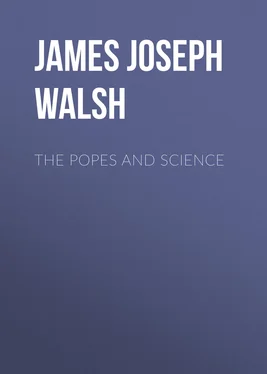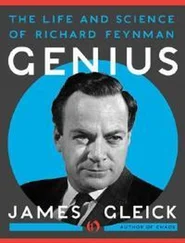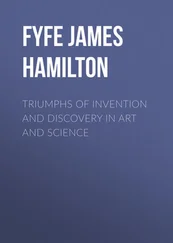James Walsh - The Popes and Science
Здесь есть возможность читать онлайн «James Walsh - The Popes and Science» — ознакомительный отрывок электронной книги совершенно бесплатно, а после прочтения отрывка купить полную версию. В некоторых случаях можно слушать аудио, скачать через торрент в формате fb2 и присутствует краткое содержание. Жанр: foreign_prose, foreign_religion, foreign_antique, на английском языке. Описание произведения, (предисловие) а так же отзывы посетителей доступны на портале библиотеки ЛибКат.
- Название:The Popes and Science
- Автор:
- Жанр:
- Год:неизвестен
- ISBN:нет данных
- Рейтинг книги:4 / 5. Голосов: 1
-
Избранное:Добавить в избранное
- Отзывы:
-
Ваша оценка:
- 80
- 1
- 2
- 3
- 4
- 5
The Popes and Science: краткое содержание, описание и аннотация
Предлагаем к чтению аннотацию, описание, краткое содержание или предисловие (зависит от того, что написал сам автор книги «The Popes and Science»). Если вы не нашли необходимую информацию о книге — напишите в комментариях, мы постараемся отыскать её.
The Popes and Science — читать онлайн ознакомительный отрывок
Ниже представлен текст книги, разбитый по страницам. Система сохранения места последней прочитанной страницы, позволяет с удобством читать онлайн бесплатно книгу «The Popes and Science», без необходимости каждый раз заново искать на чём Вы остановились. Поставьте закладку, и сможете в любой момент перейти на страницу, на которой закончили чтение.
Интервал:
Закладка:
The relation of the Popes to these advances in medicine may be best appreciated from the interest which they took in the hospitals. It was only in hospitals that cases could be properly studied, and the medieval hospitals were conducted with very nearly the same relations to the universities of that time as those that exist at the present day. In the chapter on the Foundation of City Hospitals we show that these institutions are all, as Virchow, who is surely an authority above suspicion in any matter relating to the Popes has declared, due to one great Pope. This is the best possible demonstration of supreme humanitarian interest in human ills, and their treatment. Innocent III., as we shall see, at the beginning of the thirteenth century summoned Guy from Montpelier, where he had been trained in the care of patients, and where the greatest medical school of the time existed, to come to Rome and organize the Hospital of the Holy Ghost in the Papal City, which was to be a model for hospitals of the same kind in every diocese throughout the Christian world. Literally hundreds of these hospitals were founded during the thirteenth century as the result of this initiative. Patients were not left to die, with only the hope of prayers to relieve their sufferings, but they were cared for as skilfully as the rising science of the time knew how and with the tenderness that religious care has always been able to give. For added consolation in the midst of their sufferings and as a fortifier against the thought of death, they had religion and all its beautiful influences, for which even Virchow, himself utterly unbelieving, cannot suppress a tribute.
At the beginning of the fourteenth century, the University of the City of Rome was founded by Pope Boniface VIII. Only a year or two later the Popes removed their capital to Avignon. It has often been thought that, because of this removal of the Papal capital, this University of the City never came into existence; but we have definite records of salaries paid out of the Papal revenues to professors of law and medicine about the end of the first quarter of the fourteenth century.
Down in the South of France, at Avignon itself, the Popes had for one of their chamberlains the famous Guy de Chauliac, who is always spoken of as the Father of Modern Surgery. One of the Popes of the Avignon period founded the College of Twelve Physicians at Montpelier, the foundation being sufficient to support twelve medical students, and by adding the prestige of the Pope's patronage to the reputation of the University, greatly encouraged attendance at it.
Another of the Popes of the Avignon period, Pope John XXII., who is said by President White to have been most bitter in opposition to every form of science, actually helped in the foundation of two medical schools. One of these was at Cahors, his birthplace, and the other was at Perugia, at that time in the Papal States. In founding the medical school at Perugia, Pope John insisted that its standards must be as high as those of Paris and Bologna, and required that the first teachers there should be graduates from Paris or Bologna, where were the two greatest medical schools of the time. Seven years of study, three in the undergraduate department and four in the graduate schools, were to be required, according to this bull of foundation (given in full in the appendix), before the degree of Doctor of Medicine could be conferred. If it is recalled that this standard of three years of undergraduate work and four in the graduate school, or at least of seven years of University work, is the ideal toward which our universities are struggling, and, it must be said, not with the entire success we would like, at the beginning of the twentieth century, then, it is surprising to think that the president of a modern university, deeply interested in education in all its features and himself a professor of history, should know so little of, and be so lacking in sympathy with these men who laid the deep foundations of our modern education.
Perhaps the most striking feature of the relation of the Popes to medicine remains to be mentioned. If they really were the bitter opponents of things medical that Dr. White would have us believe, then we should expect that either there were no such officials as Papal physicians, or else that the men who occupied these posts were the veriest charlatans, who knew very little of medicine, and certainly did nothing to develop the science. As a matter of fact, there is no list of physicians connected by any common bond in history who are so gloriously representative of scientific progress in medicine as the Papal physicians. The faculty of no medical school presents such a list of great names as those of the men who were chosen to be the official medical attendants of the Popes, and who were thus given a position of prominence where their discoveries in medicine had a vogue they otherwise could not have attained. The list of the Royal physicians of any reigning house of Europe for the last seven centuries looks trivial beside the roll of Papal physicians. Could the Popes possibly have done anything more than this for medicine, or shown their interest in its progress, or made people realize better, that while prayer might be of service, every possible human means must be taken to secure, maintain and recover health.
To read even the headings of Dr. White's chapter on from Miracles to Medicine, in which he tells of how "the medieval miracles of healing checked medical science," how "pastoral medicine held back scientific effort," how "there was so much theological discouragement of medicine," and finally, how "the study of Anatomy was considered a sin against the Holy Ghost," in the light of this plain, matter-of-fact story of the wonderful development of medical science in the ecclesiastically founded and ruled universities of the thirteenth century, makes one realize into what a farcical state of mind as regards the realities of history such writers have forced themselves, and unfortunately have led many readers, by their excursions into the history of medicine and science. Probably there was never a more pretentious exhibition of ignorance of the facts of history than is displayed by these expressions and by the whole drift of this chapter. Dr. White would have us believe that the thirteenth and fourteenth centuries were so backward in medicine and surgery that they practically have no history in these departments, or so little as not to be worth talking about. The simple facts show us that this is one of three or four great periods in human history in which there was the most wonderful development of medicine and surgery.
As we shall see in the course of this book, there was no bull or any other document issued by the Popes forbidding dissection or hampering the development of anatomy in any way. As a matter of fact, the ecclesiastics, instead of being behind their age in liberality of spirit with regard to the use of the human body after death for anatomical purposes, were always ahead of it. There has always existed a popular horror of dissection, and this has manifested itself from the earliest times in history down to and within the last half century, in refusal to enact such secular legislation as would properly provide for the practice of dissection. This was as true in the United States until within the memory of men still alive as it had always been hitherto in European history. Dissection came to be allowed so freely in the medieval universities founded under ecclesiastical influence and ruled by ecclesiastics, as the result of the intelligent realization on the part of churchmen that the study of the human body was necessary for a proper recognition and appreciation of the causes of the ills to which flesh is heir. They realized that the only way to lay the foundation of exact medical knowledge was not only to permit, but to encourage the practice of dissection, and accordingly this was done at everyone of a dozen medical schools of Italy during the fourteenth, fifteenth and sixteenth centuries, and nowhere more so than at the Papal University at Rome itself during the sixteenth century, at a time when, if we would believe Dr. White, the Church authorities were doing everything in their power to prevent dissection.
Читать дальшеИнтервал:
Закладка:
Похожие книги на «The Popes and Science»
Представляем Вашему вниманию похожие книги на «The Popes and Science» списком для выбора. Мы отобрали схожую по названию и смыслу литературу в надежде предоставить читателям больше вариантов отыскать новые, интересные, ещё непрочитанные произведения.
Обсуждение, отзывы о книге «The Popes and Science» и просто собственные мнения читателей. Оставьте ваши комментарии, напишите, что Вы думаете о произведении, его смысле или главных героях. Укажите что конкретно понравилось, а что нет, и почему Вы так считаете.












